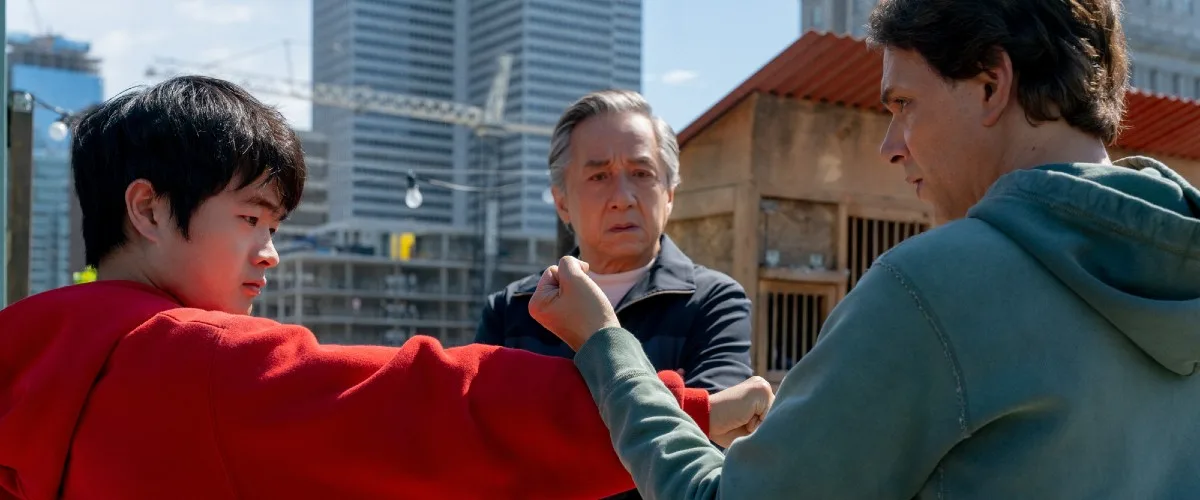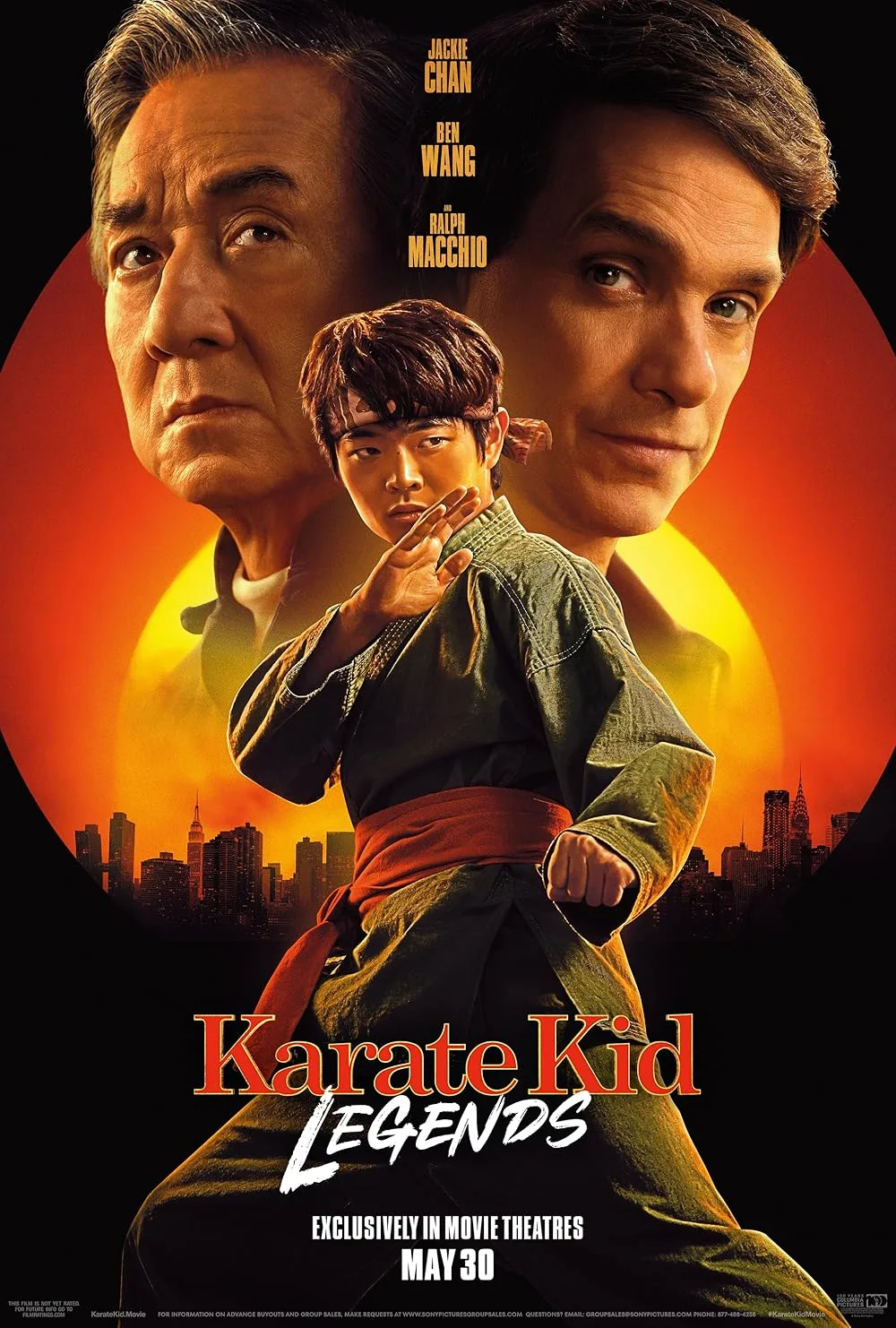The Karate Kid movies have been a part of cinema for so long that the fact that it all began as a “Rocky” rip-off has been mostly forgotten. The first three entries were even directed by the filmmaker who launched the original “Rocky,” John G. Avildsen; like the Rocky and Star Wars and James Bond and Alien movies, they mastered the trick of giving audiences the same thing, but different. Most of the movies began with the protagonist moving from a familiar place to an unfamiliar one, then showed them becoming smitten with a local girl, getting harassed by a bully who knows karate, being trained as a fighter by a wise and caring mentor, and entering a tournament to kick the bully’s butt and use the prize money to do something idealistic.
“Karate Kid: Legends,” the sixth entry in the series, gives its intended audience—which is to say, anyone who enjoyed any part of the other movies—a grab bag containing all of those elements (including a mentor role for the original Karate Kid, Ralph Macchio), plus more bits culled from all five films plus the spinoff series “Cobra Kai.” The script tries to unify the franchise by referencing every previous entry and binding them together with a new bit of information that might raise one or both of your eyebrows. The legacy sequel “Creed” tried this first, bringing back Sylvester Stallone’s Rocky Balboa to mentor a young fighter while incorporating pieces of every other installment, even ones that were poorly received. “Karate Kid: Legends” tries its own version of that but ends up seeming overstuffed and impatient. There are too many major characters, and the movie is so determined to keep the running time as short as possible that it can’t give any one character the attention they need to really pop.
The lone exception is our hero, Li Fong (Ben Wang). Li is a teenager who moved from Beijing to New York City’s Chinatown because his doctor mom (Ming-Na Wen) got hired by a Manhattan hospital. Li is a character we haven’t seen before. There are early scenes at kung fu school where we see him being mentored by Mr. Han (Jackie Chan), who replaced the late Pat Morita’s mentor character Mr. Miyagi in the 2010 reboot “The Karate Kid” (the one where the young hero and his mom left Detroit for Beijing so she could work at a car factory). Li is played by Ben Wang, who’s so acrobatic, funny, and touching that he deserves an action movie that’s entirely his.
The most intriguing element of “Karate Kid: Legends” is that Li is already skilled enough at kung fu to defend against multiple opponents in a street brawl, and a gifted enough teacher to fill the mentor role normally occupied by a silver-haired badass. Li’s Achilles’ heel is his paralysis during life-or-death moments: A manifestation of PTSD from the death of his older brother, a kung fu student who won a tournament and was ambushed and murdered by his opponent while walking home with Li. If you’ve ever seen a movie, you’ll know that the point of introducing a problem like that is to set up the moment when the hero overcomes it.
Like every protagonist before him, Li gets bullied by bratty thugs. They train at a dojo near his school. Their leader is karate prodigy Connor Day (Aramis Knight), two-time winner of the Five Boroughs tournament. Li’s school also happens to be near an independent pizzeria owned by former boxer Victor Lipani (Joshua Jackson, who has aged into a character actor with gravitas and a warm smile). Victor’s charming and witty teenage daughter Mia (Sadie Stanley) works the cash register. She and Li hit it off. Of course, Mia was once Connor’s girlfriend. Connor’s father, who owns the dojo, is a mob-connected underworld figure who loaned Victor the money to open the pizzeria and expects to be paid back soon.
That’s a lot of connections and coincidences, and the movie is just getting warmed up. The entire franchise has an old-fashioned feeling, but “Karate Kid: Legends” pushes it to the next level. It has an ’80s-style Hollywood score, insistent and sometimes bombastic. Shot in New York and Ottawa, it makes Lower Manhattan seem as gritty and cozy as Rocky’s South Philadelphia neighborhood. The film is also connected to a long tradition of urban melodramas in which young people hone a skill (sometimes dancing, sometimes singing, sometimes fighting) to win a contest and use the prize money to rescue a financially imperiled person or institution (a dance studio, a recreation center, a grandma). This time, it’s Victor’s pizzeria that needs saving. He tries to raise the loan repayment money by fighting in an underground boxing match, with Li as his trainer (a wonderful twist on the series’ master-student dynamic that could’ve driven an entire film of its own, but unfortunately doesn’t). It’s not enough.
So Li trains to beat Connor in the Five Boroughs tournament so he can pay off Victor’s debt and prevent his girlfriend from having to leave New York City. Enter Mr. Han, and also, for some reason, Macchio’s Daniel LaRusso, who rolls into the story a week before the Five Boroughs championship. Daniel runs Mr. Miyagi’s dojo in Los Angeles, as chronicled in six seasons of “Cobra Kai.” Mr. Han, Mr. Miyagi, and Daniel are all connected. Very connected. Your mileage will vary on how convinced you are. I thought it was the worst retcon since “Terminator: Genisys” decided that the human who led the rebellion against the machines was secretly a machine himself. I also didn’t buy that even the legendary Daniel LaRusso could teach Li enough karate in one week to make a difference in the championship. Still, at least the movie is self-aware enough to let Li be amused at how farfetched it is.
Written by Rob Leiber and directed by Jonathan Entwistle—who created the Netflix series “The End Of The F***ing World” and “I Am Not Okay With This”—”Karate Kid: Legends” is impressive and exasperating in its determination to squeeze every previous iteration of this story into one glimmering chunk of lore. (Li falling for a local businessperson’s daughter is taken from the third film, in which the destruction of the apartment complex where Daniel lived and Mr. Miyagi worked substitutes for the usual “here I am in a strange new land” trope.)
The movie is so relentless in its desire to pull everything together and not leave any threads dangling that it sprints through scenes where you might’ve wanted it to linger, rushes through the final tournament, and rarely gives any character or subplot its full attention. (At 90 minutes, it’s a rare sequel that could’ve benefited from being longer.) This is especially regrettable considering the quality of the main performances. Chan and Macchio banter and bicker like brothers and throw themselves into fight scenes, training montages, and slapstick. Wen does a lot with a little as Li’s mom. Stanley is so charming and earnest that she makes us believe every word Mia says, including lines that amount to the filmmakers begging us to accept something they know needed more work. Knight is a memorable bad guy, an angry young prince who can sneer with his eyes.
Yes, there is an incredibly difficult finishing move. Every Karate Kid movie has one. When Li decided the time was right to use his, I cheered like everyone else. There’s a reason why this tale keeps getting retold: it’s foolproof.




















